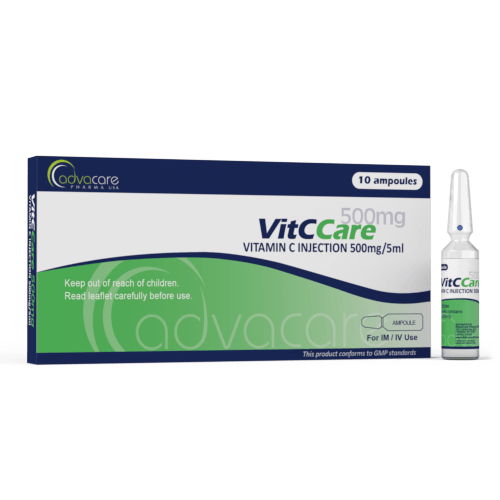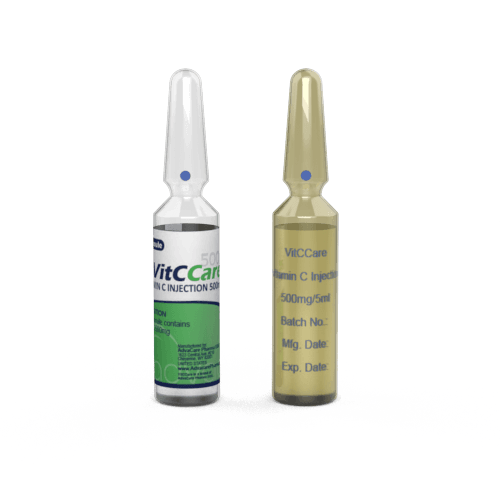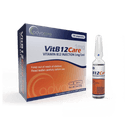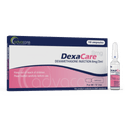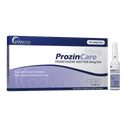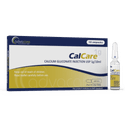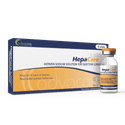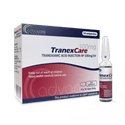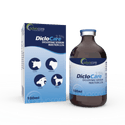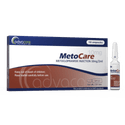- Home›
- Pharmaceuticals›
- Injections›
- Small Volume Injections›
- Vitamin C Injection
Vitamin C Injection
Dosage
Packaging
What is Vitamin C?
Active Ingredients: Vitamin C
Vitamin C Injection is used to treat vitamin C deficiency and to prevent or treat scurvy. This vitamin may be given as an adjuvant in cancer treatment. It is also used to improve immune function or to aid weight loss. Injections may also be administered to patients unable to take oral supplements.
Vitamin C is commonly referred to as ascorbic acid, but it is also known by the name of L-ascorbic acid or ascorbate. This compound is an organic substance that is classified as an antioxidant, which helps prevent cell damage due to free radicals. Vitamin C is an essential nutrient that is naturally found in foods such as citrus fruits and vegetables. It is vital for many functions in the body, including collagen biosynthesis. This vitamin is necessary for the healthy growth and development of connective tissues and bones.
Vitamin C Injections are available in a range of concentrations, including 100mg/2ml, 250mg/2ml, 500mg/2ml, and 500mg/5ml. The medicine is contained in ampoules, which are available in boxes of 10 or 100.
Vitamin C Tablets are also available for patients who are able to take oral medications. AdvaCare Pharma also produces a wide range of Vitamin C supplements, including effervescent tablets, gummies, and drops.
AdvaCare Pharma is a trusted global supplier of Vitamin C Injections. We offer a wide range of high-quality and cost-effective medications that are available for distribution. Our factories are GMP-certified and are regularly inspected to ensure they continue to meet the high standards necessary to comply with WHO guidelines and standards.
Why are we a leading Vitamin C manufacturer?
AdvaCare Pharma, a US-owned pharmaceutical company, is a manufacturer of Vitamin C Injection with GMP-compliant manufacturing facilities located worldwide. We conduct frequent GMP, third-party and internal facility inspections to ensure that our manufactured injectable treatments exceed the stringent requirements of importing countries and our distributors.
As a renown Vitamin C manufacturer and global supplier of 120+ pharmaceutical injection products, our global reach extends to over 65 markets ensuring that pharmaceutical distributors, hospitals, pharmacies, NGOs and government institutions receive the quality-assured treatments they need.
Uses
What is Vitamin C used for?
It is used to treat vitamin C deficiency and scurvy in patients unable to undergo therapy with oral medicines. Injections of vitamin C are also used in the treatment of serious wounds due to trauma or burns.
Parenteral vitamin C is sometimes administered during the treatment of certain types of cancer, either alone or in combination with other drugs.
Injections may also be given to improve immune function, to aid weight loss, or to improve general health.
How are Vitamin C Injections used?
This medication is manufactured as a solution intended to be given by injection under the skin, into a muscle, or by infusion into a vein. It is typically administered by a healthcare professional in a hospital or clinic setting, though injections may be administered in other environments.
Before use, the solution should be carefully inspected for any signs of discoloration or particles. Any contaminated ampoules should be discarded.
When administered as an infusion, this medicine must first be diluted with an appropriate solution such as 5% dextrose or sterile water for injection. Vitamin C Injection is incompatible with ferric salts, oxidizing agents, and heavy metal salts (e.g. copper). Some reported incompatibilities include aminophylline, bleomycin sulfate, erythromycin, nitrofurantoin sodium, and sodium bicarbonate.
How should Vitamin C Injections be stored?
It is advised to store unused Vitamin C Injections in a temperature-controlled environment (2-8°C). The ampoules should be kept away from light and heat. As pressure may develop within the ampoule after long-term storage, it is recommended to open the container using a protective covering.
What environmental factors contribute to the rapid degradation of Vitamin C in injection form?
It is essential to avoid exposing vitamin C to heat and light, particularly ultraviolet (UV) light, as these factors accelerate oxidation. In order to protect the vitamin C solution, this product has been specially packaged in amber ampoules, as the amber glass is able to block UV light, blue light, and light wavelengths under 450nm. In order to maintain the stability and efficacy of this product, healthcare professionals are advised to store the unused ampoules in a cool, dark place such as a refrigerator, in order to reduce their exposure to heat and light.
It is also important to note that exposure to oxygen also degrades vitamin C in this form, so it is crucial to ensure there are no leaks or cracks in the ampoule before use.
What dose should be given?
Adult Dosing For the short-term treatment of scurvy, the usual dose is 200mg IV, given daily for 1 week until the resolution of scorbutic symptoms. Alternatively, 100-250mg IM/IV/SC can be given every 1 to 2 days. The maximum dosage is 6g in 24 hours. For patients with G6PD (glucose-6-phosphate dehydrogenase) deficiency, a decreased dose should be considered.
Pediatric Dosing For the short-term treatment of scurvy, the usual dose for children is as follows:
- 5-11 months old: 50mg IV, given every day for up to 1 week.
- 1-10 years old: 100mg IV
- 11 years and older: 200mg IV, given every day for up to 1 week. Treatment can be repeated after 1 week until scorbutic symptoms resolve.
For pediatric patients with G6PD deficiency, a decreased dose should be considered.
Refer to a doctor or pharmacist for guidelines on dosage. The dosage is based on medical condition, response to the treatment, age, and weight.
Who can use Vitamin C?
Vitamin C Injections can be administered to adults and children over 5 months old, but caution is advised for specific groups of patients.
Pregnant Vitamin C Injections should only be administered to pregnant women if there is a clear need. Though there have been no reported adverse effects reported in the data, there are insufficient animal and human studies concerning reproduction capacity or the risk of fetal harm. Doses should not exceed the recommended dietary allowances, as vitamin C is known to cross the placenta.
Breastfeeding Doses should not exceed the recommended dietary allowances. It is known that vitamin C is present in milk after oral intake, however, there is no information regarding the presence of ascorbic acid in the breast milk of nursing mothers who have received intravenous (IV) doses. The risk of kidney stones is possible in high-risk infants during high-dose IV treatment. There are no human studies available concerning the effects on milk production.
Children Repeat doses are not recommended in children younger than 11 years of age. It should be noted that pediatric patients under 2 years old are at a higher risk of oxalate nephropathy, due to their immature kidneys. Renal function should be monitored in these children. It is not recommended to administer this drug to children under 5 months old.
Geriatric Vitamin C Injections are considered safe to be administered to older patients. As the glomerular filtration rate is reduced in older patients, there is an increased risk of oxalate nephropathy. Additional monitoring may be necessary.
What are the signs of an overdose of Vitamin C? Excessive amounts of vitamin C are associated with symptoms such as nausea, vomiting, diarrhea, rash, fatigue, and sleep disturbances. Overdose may result in hyperoxaluria or renal oxalate calculi if a patient's urine is acidic. It is recommended to discontinue the administration of vitamin C and treat symptoms.
Other warnings
Oxalate nephropathy has been reported in high-dose, long-term therapy with parenteral vitamin C. It is recommended to express caution when treating patients at risk, such as those with renal dysfunction, a history of oxalate kidney stones, and elderly patients. During treatment, renal function should be monitored, and treatment should be discontinued if nephropathy develops or is suspected.
For patients with glucose-6-phosphate dehydrogenase deficiency, there is an increased risk of severe hemolysis. It is recommended to monitor hemoglobin and blood count during treatment and to administer the lowest dose possible.
For patients with renal impairment, care must be taken, as this population exhibits an increased risk of acute/chronic oxalate nephropathy.
Side Effects
As with all pharmaceuticals, some unwanted effects can occur from the use of Vitamin C Injection.
Common side effects include, but may not be limited to:
- burning, stinging, or swelling near the injection site
- flushing
- faintness (associated with rapid IV administration)
- gastrointestinal discomfort (upset stomach, nausea, vomiting)
Some serious reactions that have been reported include:
- oxalate nephropathy (high-dose/long-term therapy)
- nephrolithiasis (high-dose/long-term therapy)
- hemolysis in certain patients.
For a comprehensive understanding of all potential side effects, consult a medical professional.
If any symptoms persist or worsen, or you notice any other symptoms, please call your doctor.
Precautions
Do NOT use Vitamin C Injection if:
- You are allergic to any of the ingredients.
- You have hyperoxaluria.
Before treatment, consult your doctor regarding any medications you are taking to address potential drug interactions.Some drugs that are known to have the potential to interact include antibiotics (e.g. erythromycin, kanamycin, streptomycin, doxycycline, lincomycin), warfarin, and amphetamine.
This medication may not be suitable for people with certain conditions, so it is important to consult with a doctor if you have any health conditions. Some conditions that may need additional considerations include diabetes, a history of renal calculi, and patients on a sodium-restricted diet.
Vitamin C could affect the results of laboratory tests that rely on oxidation-reduction reactions, including blood or urine glucose testing, nitrite and bilirubin levels, and leucocyte count. It is advised to delay these laboratory tests for 24 hours after parenteral vitamin C therapy.
It should be noted that this drug may also interfere with stool occult blood tests. Extraneous vitamin C should not be administered within 24-72 of the test.
This medication is unlikely to cause side effects that interfere with the ability to drive or operate machinery.
References
Overview of the possible role of vitamin C in management of COVID-19
COVID-19 presents challenges for antiviral treatment, but numerous vaccines are now accessible for prevention. Doctors primarily prescribed micronutrients like vitamins and minerals. Supportive management remains key for COVID-19 patients, with vitamin C levels in serum and leukocytes often depleted due to increased metabolic demands during the acute phase of infection.
This study revealed that administering high doses of vitamin C to COVID-19 patients can restore normal levels of the vitamin in their serum and leukocytes. This supplement boasts antiviral, antioxidant, anti-inflammatory, and immunomodulatory properties, making it a promising therapeutic option for COVID-19.
High-dose vitamin C supplementation is well-tolerated without adverse reactions, but it should be used with caution. It represents a safe, cost-effective, and readily available adjunct to COVID-19 treatment.

You might be interested in...
Why AdvaCare Pharma?
As an industry leader, we are aware of our responsibility to provide affordable and sustainable solutions to improve healthcare worldwide.
